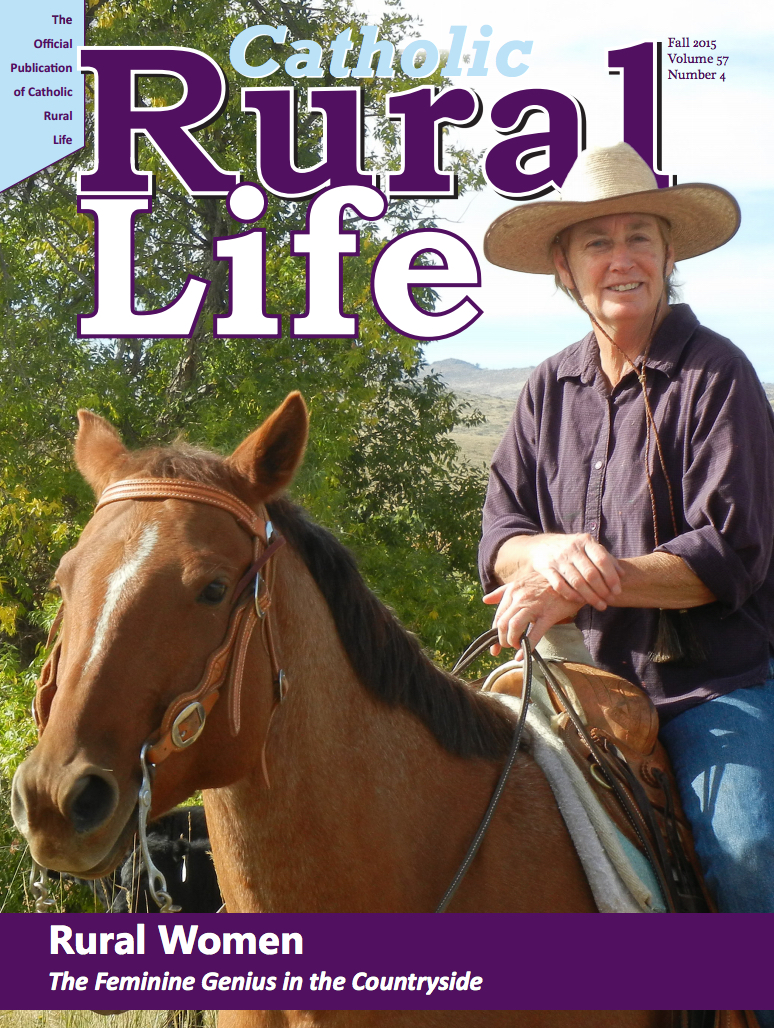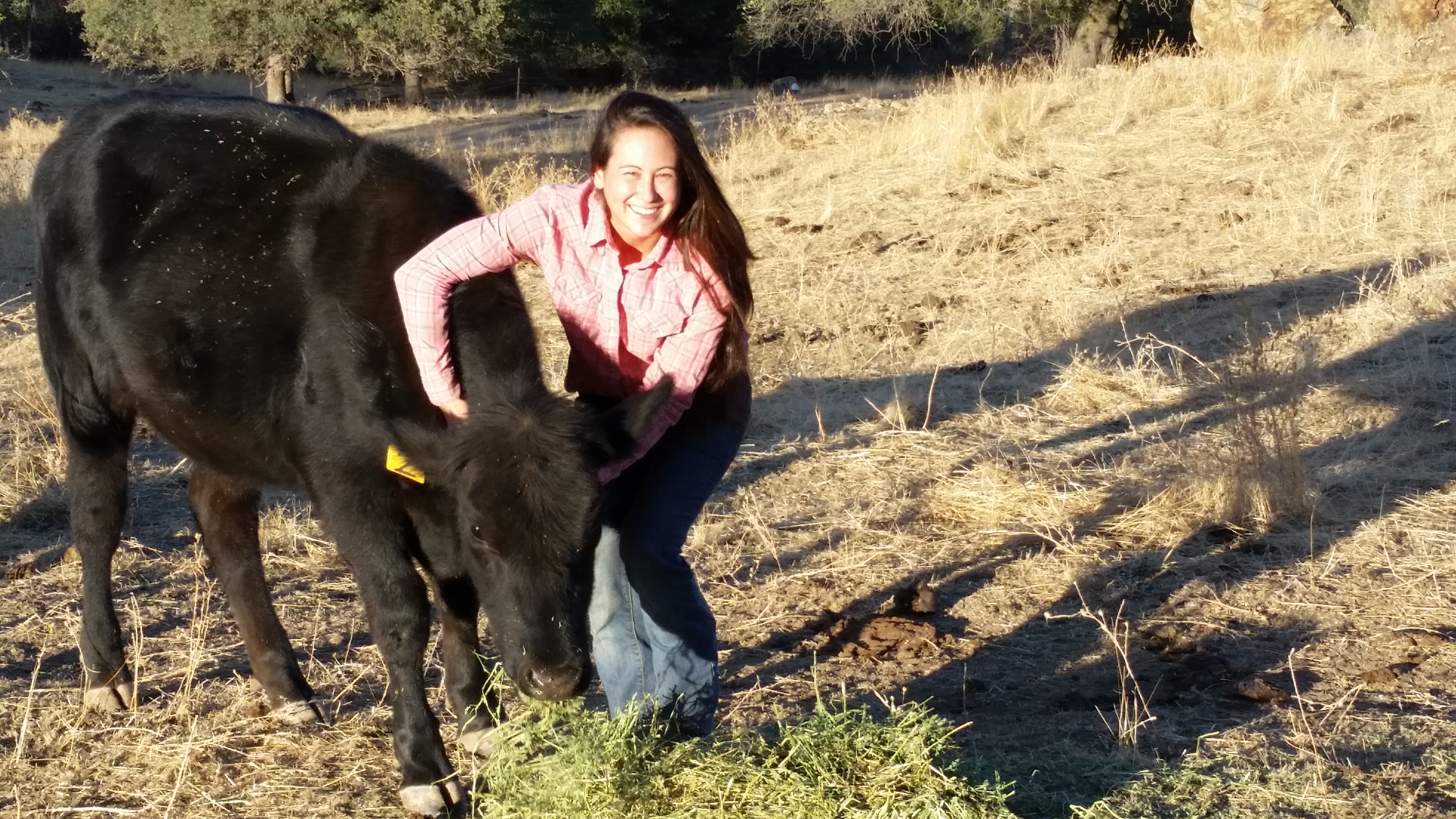 This article will be published in our Fall 2015 magazine, “Rural Women: The Feminine Genius in the Countryside.” To pre-order your copy, visit our online store. To view this article as a PDF, click here.
This article will be published in our Fall 2015 magazine, “Rural Women: The Feminine Genius in the Countryside.” To pre-order your copy, visit our online store. To view this article as a PDF, click here.
If you’re looking for the face of the next generation of ranching, look no further than Laura Kakehashi. The 23 year old more than fits the bill: she’s young, she’s passionate—and, consistent with emerging trends—she’s a woman with no previous experience in agriculture.
That hasn’t stopped her from making a mark in the world of California ranching. After only five months as an intern, Laura was hired on to manage a cattle ranch in Angels Camp. In addition to her ranch duties, she is studying animal sciences at a local college to prepare her for veterinary medical school.
After navigating some communications obstacles (her phone was recently smashed by a bull), we caught up with this inspiring young woman to hear about what drew her into ranching and what needs to be done to get more women thinking about agriculture.
CRL: Did you have any experience with agriculture beforehand?
Laura: My family always had dogs and cats and other pets, and I grew up riding horses. But other than the occasional dude ranch summer camp, I didn’t have any exposure to anything like 4-H growing up. It was a typical upbringing in a beachside town in California.
So I kind of fell into ranching. I got my first taste of being around cattle at my boyfriend’s family’s ranch. I thought it was kind of fun to get to do hands on work. It was just so different than the Southern California suburbia experience that I had grown up with.
CRL: So what exactly was it about being on a ranch and working with animals that led you to pursue this path?
Laura: I love the openness of rural life, and having that connection to your roots. I really believe that everybody, and especially people of my generation, need to be better connected to where their food comes from. So this was a great opportunity for me to do this, to get down to the nitty-gritty and actually be involved in raising the food I eat.
CRL: You’re engaged in a line of work that has traditionally been dominated by men. As a young woman, how do you fit in?
Laura: I see myself as an underdog. When I tell people that I manage a ranch, they look at me and are like “Really? You’re five foot nothing and you’re messing with those bulls?” I take it in stride. In the back of my mind, I hope I’m pioneering for more women who want to get into ranching and agriculture and get down and get dirty.
CRL: On the flip-side, do you receive support from those who recognize you’re going against the grain?
Laura: I get a lot of people who encourage me, and tell me to go for it. Sometimes they do so with a little laugh, so maybe they have their doubts, but I don’t mind proving people wrong and showing that I can do this.

CRL: As a woman, do you think you bring something unique or added to the work you do on the ranch?
Laura: Yes, I think so. I work with a male employee on the ranch, and he’s very much got a broad spectrum approach, which I think is typical of men, while I see all the little details and the nitty gritty, which is true of a lot of women. So I have noticed that we complement each other and that that kind of helps out with the balance of getting things done.
CRL: You’re fairly new to this work, but it seems like you’re doing well for yourself. Why don’t more women your age consider ranching as a viable option?
Laura: I think it’s a lack of education and a lack of exposure. In a lot of urban areas, you don’t have access to agriculture, so you can’t visit to see where your food comes from. So everyone is getting all their information about ranching and livestock from negative media accounts that don’t really accurately portray what we do or how we do it. We need to do a better job of educating young people, girls included, about where their food comes from, and show people that this is what we do. There’s a lot of good that ranchers do for the world.
CRL: So if there was better education and exposure, do you think we’d see more young women look to farming and ranching as viable options?
Laura: I think so. I think if there was a push for girls to realize that ranching is about caring for animals, not abusing them, then it would provide an outlet to get girls into agriculture. We also need to get more girls in 4-H and Future Farmers of America, which do a great job of giving people exposure and experience with farming and ranching. If we do these things, then I think there would definitely be a better drive for women to find careers within agriculture.
CRL: As a Christian, do you see any connection between your faith and the work you do?
Laura: I definitely do. There’s a bigger reason that I’m doing this. I love that I’m here on a daily basis, experiencing new life and death every day. And it’s becoming a normal thing, which I think our society forgets: there is life and there is death.
It’s especially amazing to be able to be a part of creating that new life and seeing it happen. To see a pregnant cow and then thirty minutes later to see a calf, standing up, and running around—that’s amazing. And it’s amazing to see how God works in these ways, and to be able to know that this calf is one day going to be able to provide for so many people. It kind of breaks my heart that people don’t know where their food comes from, or how much work actually went into the meal they eat at dinner.
CRL: Do you see yourself sticking on the path that you’re on?
Laura: I definitely see the cattle industry as part of my life and my future career. I’m a woman and in my twenties, so I’m part of the 1%. I definitely want to help make changes that get young women involved in agriculture and also see those changes happen in future generations to come.
Visit our “Women in Agriculture” page to learn more, including a helpful list of farm organizations supporting women.

















